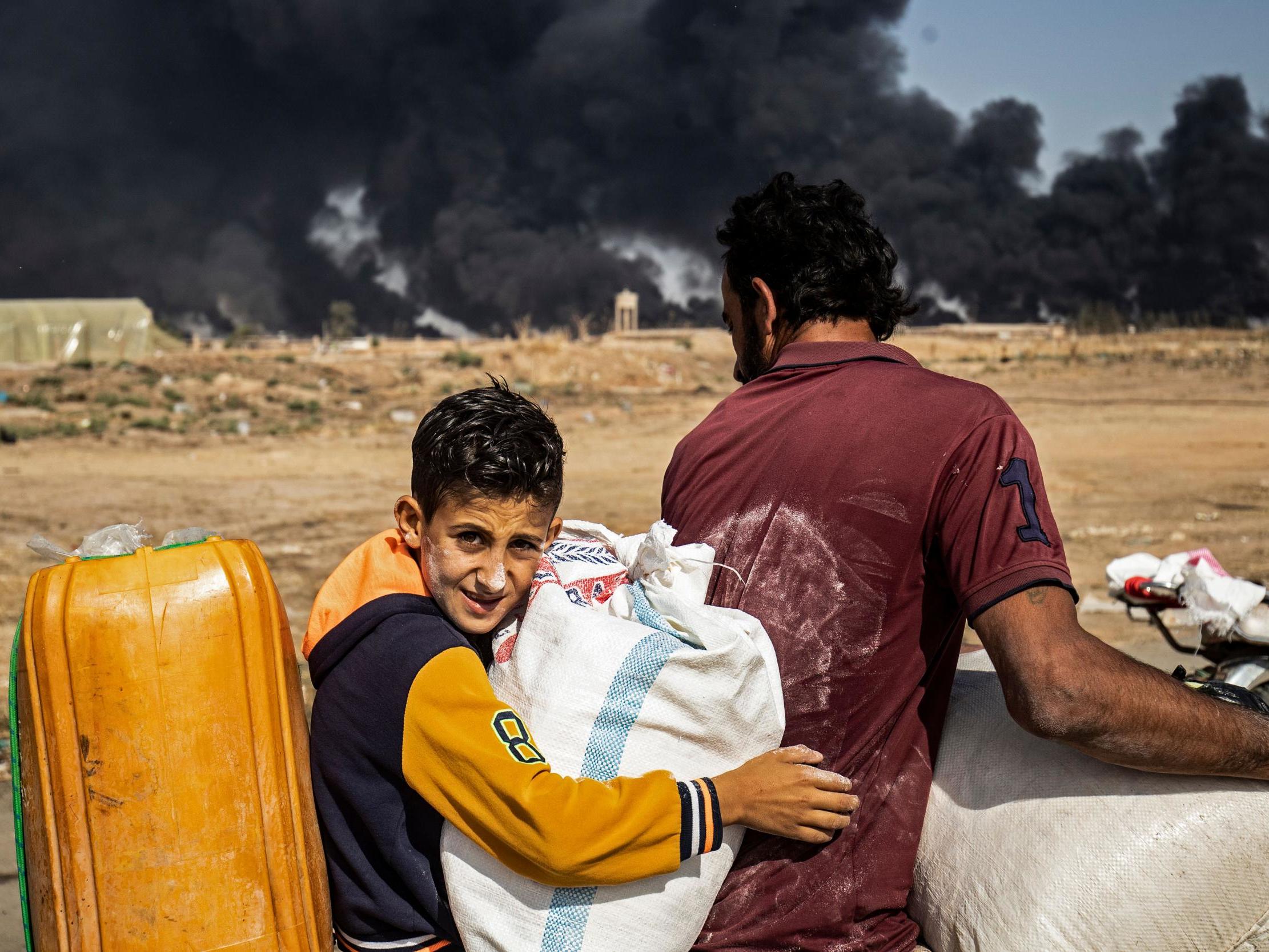UN warns of looming health crisis after foreign aid workers forced to flee Syria
As Syrian regime troops advance into Kurdish territory, Turkish President Erdogan maintains he 'will never declare a ceasefire'

The United Nations has warned humanitarian aid could be cut off to war-torn areas of northern Syria impacting hundreds of thousands of people, after foreign aid workers were forced to flee the country as Turkey’s week-long offensive intensified.
At least 71 civilians have been killed, and 300,000 have been displaced, since Ankara launched a controversial battle against Kurdish forces, according to the Syrian Observatory for Human Rights,
An unknown number of Isis fighters and their relatives held in prisons and camps have also escaped amid the fighting.
On Wednesday, ferocious battles raged in the Syrian border town of Ras Al-Ain with mortar rounds and rocket blasts heard from the adjacent Turkish city of Ceylanpinar.
Outgunned, the Kurds have struck a deal with President Bashar al-Assad, whose soldiers advanced deep into Kurdish-controlled territory on Wednesday.
Together with their Russian military allies, Syrian government troops entered the strategic border town of Kobani for the first time in five years.
Concerned by the regime’s sudden territorial gains, and under intense Turkish fire, around 300 foreign aid workers were forced to abandon their posts. The Syrian government is hostile to foreign NGOs and many remain at risk of arrest.
International aid and medical agencies, including Medicines Sans Frontieres, Save the Children, Mercy Corps and DanChurchAid, all released statements saying their intentional staff had to leave Syria, either partially or fully halting their activities there.
The UN said this has disrupted the “supply change” of aid to much of northern Syria, which before the latest conflict was already home to nearly a million displaced people who depended on aid to survive.
“Due to changes on the ground and insecurity some NGO partners have had to transfer international staff who were operating in the northeast out of the area, and others have had to temporarily suspend operations,” Hedinn Halldorsson from the agency in Damascus, told The Independent.
“Efforts continue to keep pipelines open to ensure the continuation of assistance,” he added.
President Trump dispatched his top officials to Turkey on Wednesday for emergency talks to try to persuade Ankara to halt the offensive.
Critics initially blamed Mr Trump for ”green-lighting” the incursion after he announced US troops would step aside and withdraw ahead of the imminent Turkish attack, abandoning his Kurdish allies who helped Washington defeat Isis.
The US has since punished Turkey with sanctions, including hiking up steel tariffs and pausing trade talks. A slew of countries including the UK has also imposed arms embargoes on Ankara, to little effect.
But despite the mounting pressure, Turkish president Recep Tayyip Erdogan remained defiant, saying earlier: “We will never declare a ceasefire.”
Back in Syria, meanwhile, a rebel spokesman confirmed that the “operation is ongoing in Ras al-Ain.” From the Turkish side of the border, ambulances could be seen in war-ravaged town racing away from the front, towards hospitals.
A briefing paper released by the Turkish government said the town centre of Ras al-Ain had been “cleared out of terrorists” along with 1,217 sq km of territory.
Aid workers in Syria said international staff having to evacuate the country because of regime presence, would only see the humanitarian crisis worsen.
The Kurdish Red Crescent (KRC) called the sudden withdrawal a “disaster” saying the KRC’s 1,000 or so staffers and volunteers were unable to shoulder the burden alone.
“Coordination has almost collapsed since the international staffers had to leave. The burden was on them to secure cross border aid. We were also dependent on our partners to get funds, we need international doctors to support us,” the KRC’s Dr Sherwan Berry said.
“We have such a load on our shoulders. We don’t have enough staff to man the hospitals, we lost a lot of clinics to shelling and bombing, we have 300,000 displaced people needing food, shelter, water and medical care. We are struggling to provide for them,” he added.
He said that KRC ambulances had been targeted by Turkish strikes and several hospitals taken out of service because of the fighting.
“Tens of thousands of internally displaced civilians are sleeping on the ground, lacking food, medicine and water,” he added.
A senior foreign humanitarian professional, who asked not to be named for security reasons, said should the regime retain control of northeast Syria and the border it would be “catastrophic” as they would not be able to return.
“International aid agencies have been supporting hospitals in all the major towns and cities, they have been doing water tucking, bread distribution, rehabilitating schools, water stations and irrigations canals. They are the only actors working on de-mining,” the humanitarian worker said.
Turkey launches offensive into Syria
Show all 25“Our local partners and the UN cannot handle this alone” the worker added.
Robert Onus, MSF Emergency Manager for Syria, said it was “impossible” to work in the current insecurity and they were “extremely worried about the safety of our Syrian colleagues and their families”.
“Before the fighting, you already had hundreds of thousands of displaced people who were 100 per cent reliant on aid to survive,” Onus told The Independent.
He said this was now compounded by fresh large-scale displacement, increased trauma burden from war, reduction in ability to deliver aid, as well as suspension of activities.
“The crisis is already upon us, it is just about what magnitude it will take,” he added.
Subscribe to Independent Premium to bookmark this article
Want to bookmark your favourite articles and stories to read or reference later? Start your Independent Premium subscription today.

Join our commenting forum
Join thought-provoking conversations, follow other Independent readers and see their replies